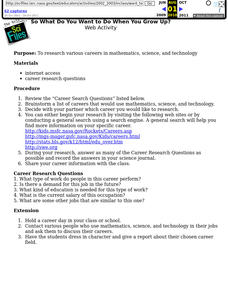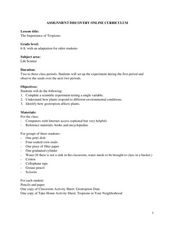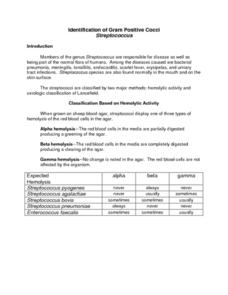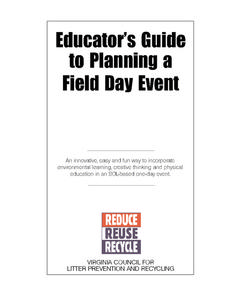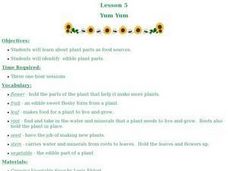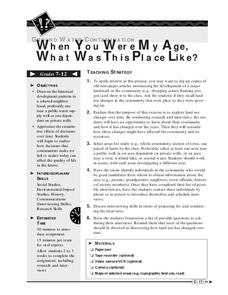Curated OER
Do They Grow Up or Down?
Pupils keep a garden journal after planting a garden and discuss environmental stresses put upon the garden for growth. In this garden lesson plan, students plant the plants differently from one another and observe the outcomes.
Curated OER
What Goes Down Must Come Up
Third graders explore the capillary action of plants. They discover what makes paper "grow" when water is dropped on it. Pupils observe how paper reacts as it absorbs water. Students use a variety of saturate solutions to grow crystals,...
New South Wales Department of Education
History of Plant Classification
Bamboo, the fastest growing plant in the world, can grow up to 35 inches in one day! Pupils learn how plants historically have been classified and determine if these traits are appropriate to use in this 17th lesson of 20. They will also...
Curated OER
So What Do You Want to Do When You Grow Up
High schoolers research the responsibilities, required education, remuneration and demand for different of varied careers in math, science and technology. They access websites which are imbedded in this plan in order to do their research.
Curated OER
Great Oaks From Little Acorns Grow
Students assemble an acorn craft to use as a puppet. They discover that acorns are the fruit and the seed from which oak trees grow. They give an example, of a historical figure or talk about a member of the community or family that...
Curated OER
How a Seed Grows: And Who Grows It
Second graders explore botany by viewing video clips in class. In this seed growth instructional activity, 2nd graders identify the types of seeds that grow specific plants and what the optimal conditions are for growing seeds. Students...
Curated OER
The Importance of Tropisms
Students investigate plant tropisms using the scientific method. In this life science instructional activity, students learn about tropisms and test the response of corn seedlings to gravity. Response questions, extensions, and an...
Virginia Department of Education
A Crystal Lab
Young chemists grow ionic crystals, metallic crystals, and supersaturated crystals in three different lab experiments. Observing these under a microscope allows pupils to compare the various structures.
PBS
Stories of Painkiller Addiction: Prescription Drug Abuse Awareness Campaign
The I-STOP law was designed to regulate the distribution and tracking of prescription drugs. After reading an article about its signing and implementation, middle and high schoolers work together to come up with their own ideas for an...
Chicago Botanic Garden
Plant Phenology Data Analysis
Scientists monitor seasonal changes in plants to better understand their responses to climate change, in turn allowing them to make predictions regarding the future. The last activity in the series of six has scholars analyze BudBurst...
Curated OER
Identification of Positive Streptococci
After being introduced to the genus Straptococcus, biology buffs set up agar plates, esculin slants, and salt broth tubes with different species to test. The level of laboratory skills required to perform this activity makes it most...
Baylor College
They're Everywhere: Bacteria
Totally gross out your class with the eighth lesson plan in this series on food science. Explore the microscopic world of bacteria by taking swabs of different classroom objects and growing colonies in petri dishes. An engaging activity...
Baylor College
Needs of Living Things: Pre-Assessment
Determine your class's prior knowledge about the necessities of life with this pre-assessment for a unit on living things. Learners draw pictures of themselves with all the things they need to live, grow, and survive. These drawings will...
Virginia Department of Education
Educator’s Guide to Planning a Field Day Event
Plan an environmentally friendly field day for your young conservationists with this collection of activities and resources. Whether it's bowling with plastic bags full of crumpled up newspaper and empty plastic bottles, or having relay...
Curated OER
How Plants Spice Up Our Lives
Third graders study plants. In this biology lesson plan, 3rd graders label and identify parts of plants, identify spices obtained from plants, and determine what part of a plant a spice comes from by using taste, touch, smell and sight.
Curated OER
Gene Puzzles
Students come to understand that in sexually reproducing organisms, such as humans, typically half of the genes come from each parent.
Students examine a fictional pedigree and determine which gene is responsible for a given trait. The...
Curated OER
Don't Use it All Up
Students observe the way that a sponge absorbs liquids and discuss how we our use of natural resources affects the environment around us. They discuss the need to conserve resources so we don't run out of what we need.
Curated OER
Hazardous Waste Cleanup Methods
High schoolers examine how hazardous wastes are cleaned up. They work together to identify the positives and negatives of cleaning up certain hazardous wastes. They answer questions as part of the activity.
Curated OER
Yum Yum: Making Vegetable Soup
Students investigate agriculture by reading a book. In this plant life lesson, students read the book Growing Vegetable Soup by Louis Ehlert, and examine the ingredients used in the book's soup. Students create an experimental,...
Curated OER
Extraordinary Extrapolation
Students study how scientists have estimated the maximum height to which trees can grow, and assess the reliability of interpolation and extrapolation techniques by making predictions with particular data sets and analyzing accuracy of...
Curated OER
Kick-Off Seed Explorations
Students explore fruit seeds and recognize that fruit seeds grow into plants like their parent fruit. In this seed lesson, students classify seeds. Students complete a KWL. Students name the fruit the seed is from.
Curated OER
When You Were My Age, What Was This Place Like?
Students discover how land use in their community has changed. In this community and ecology lesson, students scan old newspapers to find articles about the development of community land. Students discuss and predict how land use has...
K12 Reader
Water Carves the Land
What affect do bodies of water have on the world around us? Kids can find out by reading this passage. After reading, they answer five questions related to the text.
Virginia Department of Education
Meiosis
Intrigue the class by completing a lesson on meiosis, filled with challenging and insightful activities to spark the interest of every person in the room. Each member of the class learns about genetic disorders due to faulty meiosis, and...





